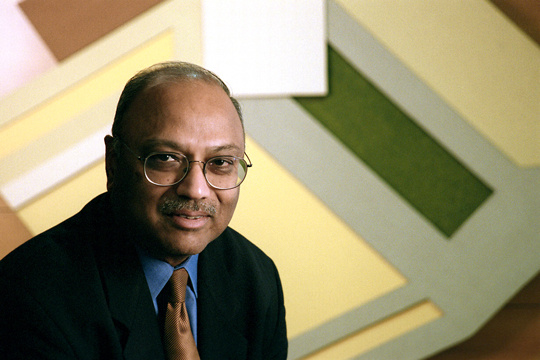C.K. Prahalad (1941-2010), one of the world’s most influential business thinkers and one of the most beloved teachers at the University of Michigan, had a huge impact on business and business education around the world.
He created the base of the pyramid idea and changed the way the world viewed India’s economic potential.
At the time of his death he held the title Paul and Ruth McCracken Distinguished University Professor of Corporate Strategy at Michigan Ross. In addition, he served as distinguished fellow at the William Davidson Institute, where he played an important advisory role for the institute's Base of the Pyramid research initiative. Prahalad twice was ranked the world's most influential business thinker, most recently in October 2009, by the "Thinkers 50" published by the leadership consulting firm CrainerDearlove.
His influence grew in 1990, when he and Ross Gary Hamel, PhD ’90, co-authored an article in the Harvard Business Review titled "The Core Competence of the Corporation." A watershed in the field of strategic management, the article asserted that executives should "identify, cultivate, and exploit the core competencies that make growth possible." Their thinking encouraged executives at complex corporations to think of their organizations as a portfolio of competencies rather than a portfolio of businesses. It influenced a wide array of business leaders grappling with the strategic implications of an ever more integrated global economy. Prahalad and Hamel made a case for robust strategic thinking in the 1994 book Competing for the Future, which analyzed how established market leaders tend to lose ground to innovative upstarts. The book famously looked at how IBM was blindsided by Apple, failing to see the future of the personal computer because it was too focused on maintaining its leadership in the mainframe business.
As the Internet took hold and the role of customer choice and customization grew more important, Prahalad focused much of his thought on how value is created. In 2004, he and Venkat Ramaswamy, professor of marketing at Ross, published The Future of Competition. The book advanced the notion of "co-creation" and envisioned a world in which businesses and consumers collaborated in designing products and services characterized by greater customization than in the past.
In recent years, Prahalad had been a leader in Base of the Pyramid studies, an area of research that explores how businesses might pursue sustainable growth while playing a role in alleviating poverty. His 2004 book, The Fortune at the Bottom of the Pyramid: Eradicating Poverty through Profits, is widely considered indispensable reading for executives and scholars who wish to understand emerging markets. The book presents 12 case studies, some of them co-authored by Ross MBA students, which illustrate how some companies are turning a profit while bringing enormous social and material improvements to some of the world’s poorest populations.
Prahalad co-wrote his final book, 2008’s The New Age of Innovation, with Ross professor M.S. Krishnan. It examines how companies can build organizational capabilities that allow them to achieve and sustain continuous change and innovation.
Prahalad passed away in San Diego, Calif., on April 16, 2010, at the age of 68. He is survived by his wife, Gayatri Prahalad; son, Murali Prahalad; daughter, Deepa Prahalad; and three grandchildren.
Born Coimbatore Krishnarao Prahalad in the southern Indian state of Tamil Nadu, he earned a degree in physics from the University of Madras. He went on to receive a post-graduate diploma in business administration from the Indian Institute of Management, Ahmedabad, in 1966 and followed that with a doctor of business administration from Harvard Business School in 1975.
A professor at the University of Michigan since 1977, Prahalad earned the University’s highest distinction, Distinguished University Professor, in 2005. He won the McKinsey Prize four times for the best article in Harvard Business Review and held honorary doctorates in economics, engineering, and business. Among the numerous other awards he received were the Faculty Pioneer Lifetime Achievement Award from the Aspen Institute for contributions to social and environmental stewardship; the Italian Telecom Prize for Leadership in Business and Economic Thinking; Lal Bahadur Shastri Award for Excellence in Management, 2000, presented by the President of India; and many others. He served on several boards, including NCR Corp., Hindustan Lever Ltd., and TVS Capital.





